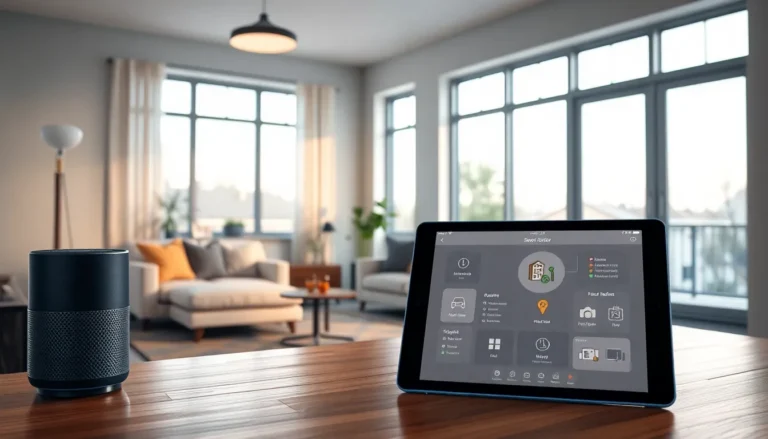In a world where energy bills can feel like a black hole for your wallet, it’s time to turn the tide. Saving energy doesn’t just help the planet; it also keeps those pesky bills in check. Who wouldn’t want to save a few bucks while doing their part for Mother Earth?
Table of Contents
ToggleOverview of Energy-Saving Tips
Energy-saving tips provide actionable strategies to enhance efficiency in homes and workplaces. Adopting simple adjustments can significantly reduce electricity consumption. Individuals benefit by lowering utility bills while lessening environmental impact.
Utilizing energy-efficient appliances represents a key strategy. These appliances consume less energy than standard models, yielding substantial savings over time. Replacing old bulbs with LED lights also improves energy use, consuming up to 80% less electricity.
Implementing smart thermostats stands out as another effective approach. Smart thermostats adjust heating and cooling based on occupancy, ensuring energy isn’t wasted. Setting the thermostat a few degrees lower in winter and higher in summer can lead to impressive energy savings.
Sealing gaps and adding insulation prevents air leaks. Proper insulation in attics, walls, and basements helps maintain desired temperatures. Investing in weather stripping around doors and windows also increases energy efficiency.
Regular maintenance of HVAC systems ensures optimal performance. Cleaning or replacing filters every month allows for better airflow, using less energy. Scheduling annual professional inspections keeps systems running efficiently.
Additionally, unplugging devices when not in use helps eliminate phantom loads. Power strips allow for easier management of multiple devices, minimizing wasted energy. Being mindful of water heater settings can also enhance energy savings.
Practicing energy-conscious behaviors like turning off lights in unoccupied rooms further decreases consumption. Utilizing natural light whenever possible can significantly reduce the need for artificial lighting. Each small effort contributes to overall energy reduction and financial savings.
Benefits of Energy Efficiency

Energy efficiency offers significant advantages in both financial and environmental aspects. By adopting energy-saving practices, households and businesses can experience substantial benefits.
Cost Savings
Lower energy bills result from improved energy efficiency. Energy-efficient appliances often consume less electricity, leading to reduced costs over time. Statistics show that energy-efficient upgrades can lower utility expenses by 10 to 50 percent annually. Additionally, these changes provide long-term savings through increased durability and reduced maintenance needs. Homeowners might also qualify for tax credits or rebates, further enhancing monetary savings. Simple actions, like switching to LED bulbs or using programmable thermostats, can create noticeable financial relief.
Environmental Impact
Energy efficiency positively influences the environment. By consuming less energy, individuals contribute to a reduction in greenhouse gas emissions. It estimates that improving energy efficiency could lower global CO2 emissions by up to 60 percent by 2050. Utilizing renewable energy sources alongside energy-efficient practices minimizes reliance on fossil fuels. Each energy-efficient device contributes to resource conservation and reduces the overall carbon footprint. An increased reliance on efficiency leads to cleaner air and healthier ecosystems, making it beneficial for both people and the planet.
Home Energy-Saving Tips
Energy-saving measures at home enhance efficiency and reduce costs. Implementing several strategies can lead to significant savings.
Insulation and Sealing
Proper insulation plays a crucial role in maintaining home temperature. It minimizes heat loss during winter and keeps cool air inside during summer. Sealing gaps around windows and doors prevents drafts, promoting comfort and energy efficiency. Consider using weather stripping or caulking to address leaks. Homeowners can save up to 20% on heating and cooling costs by improving insulation. Materials like fiberglass or foam board are effective choices for insulation in walls and attics. Regularly assessing and upgrading insulation ensures optimal performance throughout the year.
Efficient Appliances
Energy-efficient appliances consume less electricity, contributing to lower energy bills. When shopping, look for appliances labeled with Energy Star certification. Dishwashers, refrigerators, and washing machines with this label indicate superior energy performance. These appliances can reduce energy use by 10 to 50% compared to standard models. Additionally, practice mindful usage by using appliances during off-peak hours to save further. Regular maintenance of appliances prolongs their lifespan and keeps them operating at peak efficiency. Small changes in appliance use can lead to significant savings over time.
Energy-Saving Tips for Transportation
Energy-efficient transportation choices contribute significantly to reducing energy consumption and costs. Implementing eco-friendly commuting practices and prioritizing vehicle maintenance can enhance both efficiency and sustainability.
Eco-Friendly Commuting
Using public transportation reduces individual carbon footprints. Biking or walking short distances also offers health benefits while conserving energy. Carpooling allows multiple people to travel in a single vehicle, thus lowering fuel consumption. Telecommuting eliminates the need for travel altogether, saving time and energy. Each of these methods can decrease overall transportation-related emissions, supporting a cleaner environment.
Vehicle Maintenance
Regular vehicle maintenance optimizes fuel efficiency and performance. Ensuring tires are properly inflated can improve gas mileage by up to 3%. Routine oil changes and filter replacements keep engines running smoothly. Additionally, performing a tune-up as per manufacturer recommendations enhances overall efficiency. Addressing mechanical issues promptly prevents excessive energy waste and reduces long-term repair costs. Prioritizing maintenance leads to a more fuel-efficient vehicle, contributing to energy conservation.
Workplace Energy Efficiency
Incorporating energy-saving practices in the workplace enhances both sustainability and cost-effectiveness. Implementing specific strategies leads to significant improvements in energy efficiency.
Utilizing Technology
Leveraging technology boosts energy efficiency in office settings. Smart lighting systems automatically adjust brightness based on occupancy and natural light levels, significantly lowering electricity use. Energy management systems provide real-time data, helping monitor energy consumption and identify patterns. Additionally, using energy-efficient office equipment, such as Energy Star-rated printers and computers, reduces overall energy demands by 10 to 50 percent. Scheduling regular updates for software and hardware ensures optimal performance, further enhancing energy efficiency.
Employee Engagement
Fostering a culture of energy conservation engages employees in energy-saving practices. Establishing clear goals and encouraging participation stimulates awareness of energy usage. Implementing simple monitoring tools, like energy dashboards, allows staff to track their consumption, motivating them to adopt energy-saving behaviors. Offering incentives for departments that achieve energy-saving targets encourages friendly competition. Regular training sessions on best practices, such as using natural light and turning off equipment, enhances overall workplace efficiency, leading to reduced energy costs.
Embracing energy-saving practices is a win-win for both the environment and personal finances. By making simple adjustments at home and in the workplace, individuals can significantly cut down on energy consumption and costs. Every small step taken—whether it’s using energy-efficient appliances or adopting mindful commuting habits—adds up to substantial savings and a healthier planet.
As more people commit to these practices, the collective impact can lead to a cleaner environment and reduced greenhouse gas emissions. The journey toward energy efficiency is ongoing, and each effort contributes to a sustainable future. By prioritizing energy conservation, everyone can play a part in fostering a more eco-friendly world while enjoying lower energy bills.









